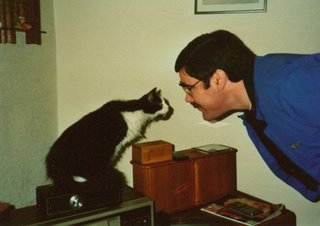Spike it!
Lewis had a camp set up just below the forks (of the Missouri River). He had a canopy formed from one of the large sails. At 4:00 p.m., he called a conference. Dispensing with Drouillard and the sign language, he decided to use a translation chain that ran from Sacagawea, speaking Shoshone to the Indians and translating it into Hidatsa, to Charbonneau, who translated her Hidatsa into French, to Private Francis Labiche, who translated from French to English. Scarcely had they begun the cumbersome process with Sacagawea began to stare at Cameahwait (the Shoshone chief). Suddenly recognizing him as her brother, 'she jumped up, ran & embraced him, & threw her blanket over him and cried profusely.' What a piece of luck that was. No novelist would dare invent such a scene. As James Ronda writes, "the stars danced for Lewis and Clark." (Undanuted Courage, p. 277) There are scattered maps, and some illustrations throughout, but only when words fail and a representation can add color, and Ambrose depends on the journals of Lewis and Clark for the most immediate descriptions, going so far as to retain the original misspellings and punctuations of the two men (Ambrose ruefully laments writing the book with the use of "SpellCheck"). One is left with a mind boggled by the monumental task that was commissioned by President Jefferson of his protege, Lewis, to survey the Louisiana Purchase and beyond, and of just how adept Lewis was in his painstaking research, record-keeping and planning for the task. Ambrose is always quick to praise Lewis and Clark, particularly for their skill as commanders (Ambrose, as an author, is renowned for his WWII volumes, and as a scholar, for his work with Eisenhower), but is equally quick to point out their failings, while acknowledging them being men of their times. Clark's post-trip treatment of his slave, York, who was an equal member of the group and walked every step of the way West, comes under deserved question, as well as Lewis' inconsistent policy towards American Natives. Ambrose also gives Sacagawea her rightful due (she did, after all accompany the troop from the mid-West to the Pacific Coast and back, while caring for her infant), where Lewis and Clark apparently did not. Incredibly, for all the unkowables and the hazards, only one man died, and skirmishes with the tribes they encountered were kept to a minimum. And a wealth of knowledge was gathered and recorded. An amazing feat. Like every description of the expedition, the journey home goes by in a flash, and Lewis' erratic post-expedition behavior leading to his suicide becomes the focus. A combination of many factors led to it, and one can see the focus that characterized Lewis' behavior moving west becoming scattered in a whirl of hubris, adulation, greed, unrequited love, drunkeness and self-medication. New challenges were thrown at him, and Lewis, flush with fame and ambition, couldn't say no. Better for him to have stayed in Washington, and tended to the editing and publishing of his journals. But they went unpublished. Perhaps he thought there was no hurry (though as Governor of Louisiana he knew that settlers were already starting to follow in his foot-steps), or perhaps he kept delaying until inspiration came along, as he was hyper-critical of his attempts at prose. Maybe he just wanted to cash in on a burgeoning fur-trade that promised to be far more lucrative than the profits from his book deal. But after the triumph of the Expedition, he found only disappointment, and in the taking of his life, cast a pall on its works--an injustice that history would not let stand. That sentence resounds with a thud which might be amusing to the alumni. And then there is Jefferson's effusive summation of Lewis written in one long precise sentence. An unprecedented journey, ending too soon. I could have read this book for a few more weeks. Undaunted Courage by Stephen Ambrose
Undaunted Courage by Stephen Ambrose
Appropriately enough, this book was a long journey. Now incredibly dog-eared, its cover in a perpetual twirl, this book has been in my car and kept me occupied, entertained, and entranced through many a ferry-crossing. The story of Lewis and Clark never impressed me in grade school, became more of an interest as its bicentennial approached, intrigued, the more and more markers of it I passed in my travels and reached full exploratory mode after seeing Clay Jenkinson perform a couple of chautauqua talks as Merriwether Lewis, alone or with a fellow scholar who portrayed Clark. I've read a couple of books by Ambrose (and have another in my stack of "to-reads") and he has an easy, popular style that expresses the facts and lets other authors who've covered the subject do the flummery. Take, for instance, this passage, describing what surely must be the most amazing occurence during the trek West. It involves a parlay between The Corps of Discovery and the Shoshone tribe for horses desperately needed for passage over the the Continental Divide, and directly involves Sacagawea, the teenaged Indian woman, who, with her husband Toussaint Charbonneau, had been living with the Mandan tribe, and who joined the Corps as interpreters:The publication of the Thwaites edition of the journals at the end of the century began a revival. It has continued, and the reputation of the captains have soared. Today, there are statues to Meriwether Lewis and William Clark; some towns, some counties, many high schools, and numerous streets are named for them. There is a Lewis and Clark College. (Undaunted Courage, p. 484)
Of courage undaunted, possessing a firmness & perseverance of purpose which nothing but impossibilities could divert from it's direction, careful as a father of those committed to his charge, yet steady in the maintenance of order & discipline, intimate with the Indian character, customs & priciples, habituated to the hunting life, guarded by exact observation of the vegetables & animals of his own country, against losing time in the description of objects already possessed, honest, disinterested, liberal, of sound understanding and a fidelity to truth so scrupulous that whatever he should report would be as certain as if seen by ourselves, with all these qualifications as if selected and implanted by nature in one body, for this express purpose, I could have no hesitation in confiding the enterprize to him. (Undaunted Courage, p. 484)
 I'm reading Lynn Truss' "Eats Shoots and Leaves" (trying to corral some of my bad punctuating habits), but the next book I'm reading for pleasure arrived unannounced in the mail the day before Christmas, sent by Dan of Cape Cod Public Radio, whose Voice is of Burnished Oak (Jean Godden described it thus--I, on the other side of the forest, have a voice of distressed balsa). He works for the Producer/Author of it (and it's autographed!!), I think I may have mentioned how much I admire the concept and execution of this resurrected project. I'll be poring over various belief systems trying to improve on my own (which comes down to, roughly, "I believe I'll have another piece of chocolate!"), Then, I'm going to take a vacation break (like I do every so often) with a Travis McGee.
I'm reading Lynn Truss' "Eats Shoots and Leaves" (trying to corral some of my bad punctuating habits), but the next book I'm reading for pleasure arrived unannounced in the mail the day before Christmas, sent by Dan of Cape Cod Public Radio, whose Voice is of Burnished Oak (Jean Godden described it thus--I, on the other side of the forest, have a voice of distressed balsa). He works for the Producer/Author of it (and it's autographed!!), I think I may have mentioned how much I admire the concept and execution of this resurrected project. I'll be poring over various belief systems trying to improve on my own (which comes down to, roughly, "I believe I'll have another piece of chocolate!"), Then, I'm going to take a vacation break (like I do every so often) with a Travis McGee.



























